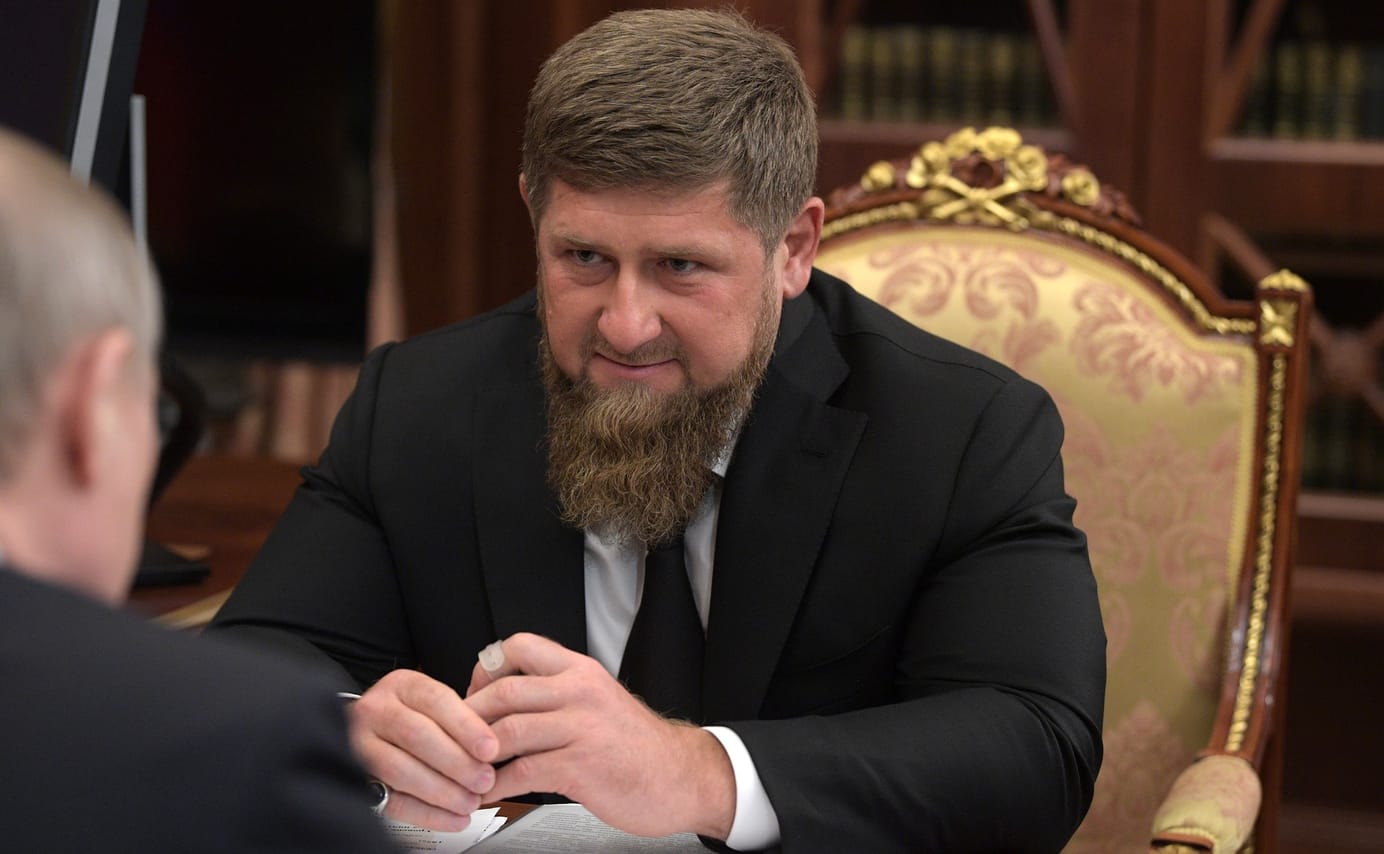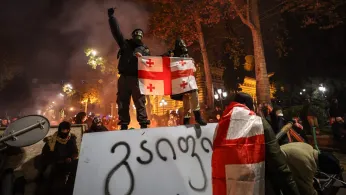
Kadyrov & the Kremlin
Hello! This week our top story is on the Kremlin’s apparent backing for Chechen leader Ramzan Kadyrov in his extra-judicial pursuit of an opposition blogger. We also look at why inflation continues to rise despite predictions by officials and analysts, and the reaction to HBO’s documentary on opposition leader Alexei Navalny.
Putin hosts Kadyrov amid criticism over ‘blood feud’
Ramzan Kadyrov, the leader of the North Caucasus republic of Chechnya, has long been allowed to flout Russian law. And the Kremlin this week reaffirmed his untouchable status as security officers loyal to the former warlord continued their high-profile pursuit of the family of an opposition blogger. The blogger’s mother — a woman of retirement age and seriously ill — was last month detained in her apartment in the city of Nizhny Novgorod and taken to Chechnya. Amid a wave of outrage, Kadyrov arranged a meeting with President Vladimir Putin and flooded his social networks with photographs from the Kremlin.
- Kadyrov last month declared war on the family of 63-year-old Saidi Yangulbayev, a former high court judge. Chechen police officers came to Yangulbayev’s apartment in Nizhny Novgorod — some 1,100 miles from Chechnya — and tried to detain the retired legal official and his diabetic wife, Zarema Musayeva, on fraud charges. They did not manage to seize Yangulbayev because the law states that ex-federal judges enjoy immunity from prosecution. But Musayeva was arrested and driven to Chechnya without even being allowed to put on her shoes.
- The day of this de facto kidnapping, Kadyrov said that “there’s a place waiting for Yangulbayev’s family, either in jail or under the ground” and added he would do everything to find all members of the Yangulbayev family. Adam Delimkhanov, a member of the Russian parliament from Chechnya and a close associate of Kadyrov, said (in Chechen) that he had declared a “blood feud” with Yangulbayev.
- Kadyrov’s real target is the son of the former judge, who hosts 1ADAT, an opposition channel on messaging service Telegram reporting on kidnappings and torture in Chechnya. “All the Yangulbayevs soiled their hands with the vile allegations,” Kadyrov wrote online. “From now on, this family will have to live while looking over their shoulders and fearing any knock on the door. Our people are so offended by the vile and hysterical words of the Yangulbayevs that the very first Chechen will deal with them as soon as the opportunity arises.”
- Putin’s press secretary Dmitry Peskov has faced repeated questions from journalists in recent days about the fate of Musayeva, and the threats made by Kadyrov and his entourage. He has offered few reassurances.
- The Chechen capital of Grozny saw thousands of people assemble Wednesday at a rally in which portraits of the Yangulbayev family were burned. Despite coronavirus restrictions, police officers did not attempt to stop the demonstrators from gathering.
- Putin met with Kadyrov in Moscow later the same day even though Peskov had denied there were any plans for such an encounter. Kadyrov said it was a “good” meeting and that Putin supported the Chechen authorities. “There were some hot topics that needed the president’s personal involvement,” he said. Later, Kadyrov met with Prime Minister Mikhail Mishustin. Throughout his day in Moscow, Kadyrov posted photos and videos from the Kremlin to his press minister’s page on social media site Instagram (Kadyrov himself has long been banned from Instagram).
- “Kadyrov believes himself to be the absolute master of all Chechens, wherever they might be – in Norway, Nizhny Novgorod, the U.S. or Georgia,” explained human rights activist Igor Kalyanin. “All Chechens are his property, to do with as he will. If he wants, he will tear off a leg; if he wants he can break an arm; if he wants, he can throw them in jail,” he said.
- Officially, there is no confirmation that Putin discussed the Yangulbayev family during his meeting with Kadyrov. And spokesman Peskov “completely disagreed” with one journalist who suggested that the situation in Chechnya was “out of control”.
Why the world should care
Kadyrov’s status is the result of a political bargain: as long as he maintains control over Chechnya, Moscow gives him free rein. But his influence has increasingly been felt far beyond Chechnya’s borders — he is suspected of murdering journalists and political opponents, and was linked to the assassination of opposition leader Boris Nemtsov in 2015. In addition, many Chechen security officers have a side hustle in which they offer their services as ‘muscle’ to businessmen. The existence of such a paramilitary force makes some fear Kadyrov could play the role of kingmaker in the event of a major political crisis.
Inflation confounds expectations, hits 3-year high
Annual inflation was reported this week to be running at up to 8.5 percent in December, its highest level since October 2017. It shows no sign of slowing despite the Central Bank raising interest rates seven times last year. Central Bank head Elvira Nabiullina even said recently that inflation was likely to start falling in early 2022.
Central Bank analysts identified several reasons for high inflation:
- Unemployment in Russia is at a record low (4.3 percent of the ‘economically active’ population), which increases strain on the labor market.
- Growth rates for lending — particularly consumer borrowing — remain high.
- Tariffs, salaries and pensions that are linked to the previous year’s inflation rate could trigger an inflationary spiral.
- Geopolitical tensions are driving up costs for commodities, especially oil, and the value of the Russian currency is falling.
- The spread of the Omicron variant brings a risk of production line disruption due to staff sickness.
In addition, much of the economic growth in Russia last year (GDP is expected to rise by as much as 5 percent) has been driven by credit. This contributes to increased demand — and often this demand outstrips production capacity, leading to higher prices.
Why the world should care
With inflation showing no sign of slowing and Russia in the grips of an Omicron wave, the Central Bank is likely to increase interest rates further (despite them being at their highest level since 2017).
Navalny film wins plaudits at Sundance
Sundance Independent Film Festival last month screened a new documentary about the attempt to poison Russian opposition leader Alexei Navalny. The movie, which was filmed by CNN journalists for HBO Max, won two audience awards. Navalny remains in prison in Russia and, on the day of the premiere, he and his associates (several of whom have fled Russia) were added to a national register of terrorists and extremists.
- Leading Russian cinema website Kinopoisk, placed ‘Navalny’ in its critics’ choice of the top ten most interesting movies at Sundance. On review aggregator Metacritic, the movie scored 77 points based on eight reviews. “Subject and filmmaker alike [are] bound together by the shared belief that authoritarian governments are as scared of their people as their people are of them”, observed Indiewire critic David Ehrlich. The film “is at least as sad as it is pulse-pounding”, was the verdict of Daniel Feinberg from The Hollywood Reporter.
- A few days after the premiere, Russian media watchdog Roskomnadzor threatened to block independent media outlets if they did not take down their reporting on corruption investigations published by Navalny’s team between 2017 and 2020. These investigations included an expose of the so-called ‘Putin Palace’ on the Black Sea and real estate acquired by former prime minister Dmitry Medvedev.
- No-one has yet acquired the rights to show the ‘Navalny’ movie in Russia. Investigative journalist Cristo Grozev who helped investigate Navalny’s poisoning and featured in the film himself, said that the movie would eventually be available on a streaming service — but did not give details. For now, Russian viewers appear to be watching pirate copies of the movie. Investigator Maria Pevchikh, who worked closely with Navalny, tweeted Tuesday that the pirate versions “had a terrible picture and dubbing that makes the ears bleed”.
Why the world should care
The combination of Navalny and Hollywood appears to have captured the imagination of many Russians — the movie has an anticipation rating of 92 percent on Kinopoisk.



